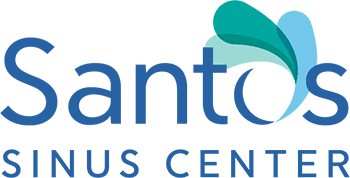Medical Sinus Treatments
Breathe Better to Live Better
Santos Sinus Center provides conservative medical sinus treatments with the goal of decreasing inflammation of the lining of the sinuses and allowing improved and healthy mucus flow out of the sinuses and nose.Healthy sinus drainage is similar to a flowing, clean stream. Remarkably, healthy adult sinuses produce two quarts of thin normal mucus per day. This thin mucus flow carries away unwanted allergens, pollutants, and inflammatory mediators. An unhealthy sinus with restricted flow can be compared to a pond with poor drainage and stagnant overgrowth of pathogens. Not until better outflow is established will the sinus health improve.
Typical symptoms of sinusitis include:
- “Sinusache” (pressure, pain, or headache of the forehead, eyes, nose and cheeks)
- Discolored drainage
- Sore throat
- Loss of smell
- Congestion
- Fatigue
“Through a DNA test at Santos Sinus Center, I found out I had an unusual bacteria in my sinus cavity. Dr. Santos treated it with nasal rinses. I’ve referred so many people to Dr. Santos. He follows up with you and makes sure you are doing well. He’s just a kind human. Today, I’m much, much happier.”
Santos Sinus Center Patient

Sinus Health 101
The nose and sinuses are designed to filter and humidify the air we take into our lungs. When we breath with our mouth, we allow more unwanted contaminants in the lungs. Today, state-of-the-art medical therapy for sinusitis has advanced tremendously. Rather than take chronic oral histamines, decongestants, steroids, or intermittent oral antibiotics, new and more advanced treatments are available with very few, if any, side effects.
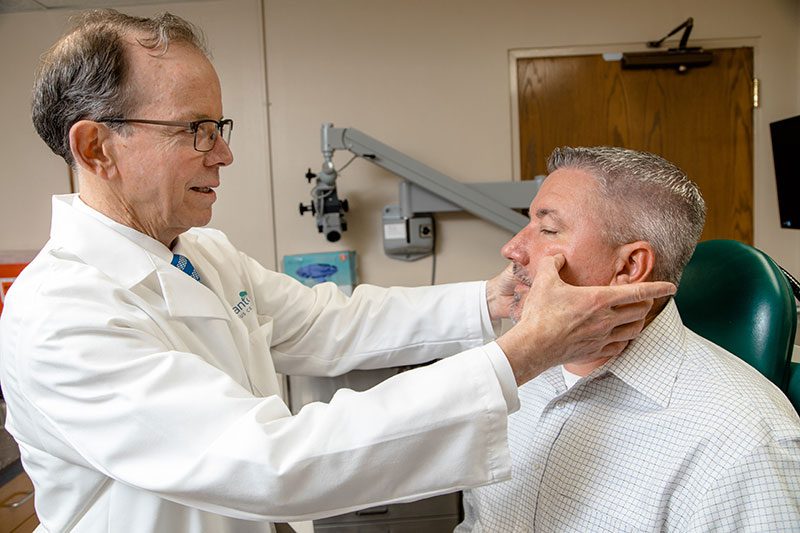
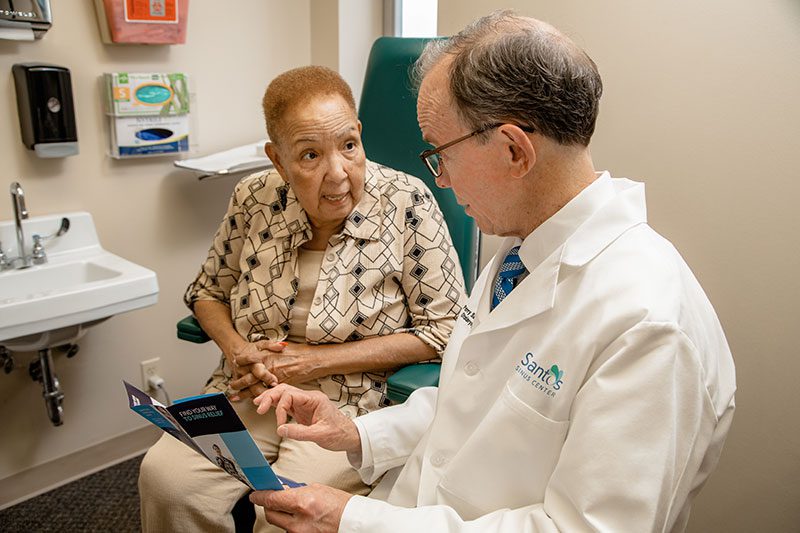
Progressive steps to improve sinus health:
Avoidance:
Try to steer clear from dusty, dirty, allergic environments. Wearing a mask may also help to some extent.
Nasal Irrigation:
Rinsing the nose daily with a normal, pH-balanced saline will decrease inflammation by removing allergens, pollutants, and the sinus’s own inflammatory mediators.
Nasal Steroids:
Using nasal steroids decrease inflammation of the sinus lining in patients with allergies and infections. While many brands are now available over the counter, several may come with unwanted side effects. The most effective nasal steroids are available only by prescription and are placed inside a sinus rinse bottle. Studies have demonstrated far superior distribution of the steroid in a saline irrigation technique compared to intranasal steroid sprays.
Sinus Infection Treatment:
Identifying each patient’s “culprit” bacteria or fungus is far more exact now due to the availability of DNA identification of bacterial species and their resistant genes and fungal species. Standard cultures are not near as accurate as DNA analysis. With the knowledge of which specific bacteria, resistant genes, and fungus are present in the nose, Dr. Santos can prescribe topical nasal rinses with the targeted antibiotics and/or antifungals to rinse out and kill the pathogens in the sinuses. This medicated approach allows direct contact and elimination of both the bacteria and fungus.
Benefits: Prolonged oral antibiotics can cause significant injury to the gastrointestinal tract by eliminating the healthy bacteria of the intestinal tract. Topical nasal therapy avoids prolonged oral antibiotics. As the harmful bacteria and or fungus of the sinuses are eliminated, the sinus lining inflammation decreases and mucus flow becomes healthy again. This conservative management is so successful, many patients may not elect any type of surgical intervention. However, patients who also have structural abnormalities and/or polyps will generally require a surgical procedure.
Chronic Resistant Infections:
Found in patients who experience recurrent infections and respond poorly or only temporarily to repeated oral antibiotics, chronic resistant infections can be hard to manage. If a patient does not respond to our topical regimen of a sinus rinse with targeted antibiotics, we work with Infectious Disease Doctors who will administer long-term intravenous antibiotic therapy. This method avoids long-term antibiotic exposure to the gastrointestinal tract.
The SNOT Scale
(Sino-Nasal Outcome Test©)
The SNOT Scale is a validated statistical quality of life instrument for assessing sinus health. Each symptom category is scored from normal sinus health (0) to the worst health (5). Each of these symptoms are then added together to obtain a final score. Patients fill out the SNOT scale forms from their initial evaluation, then after medical treatment (if appropriate), then after surgical management (if indicated). We believe data drives innovation, so our team began compiling and analyzing our recorded patient “SNOT scores” from 2015 to current.
The graph below illustrates our treatment methods in progressive order and our patients’ overall average SNOT scale score after completing each one.
- Initial Evaluation
- After Medical Therapy | 36% Improvement, COMPARED TO INITIAL EVALUATION
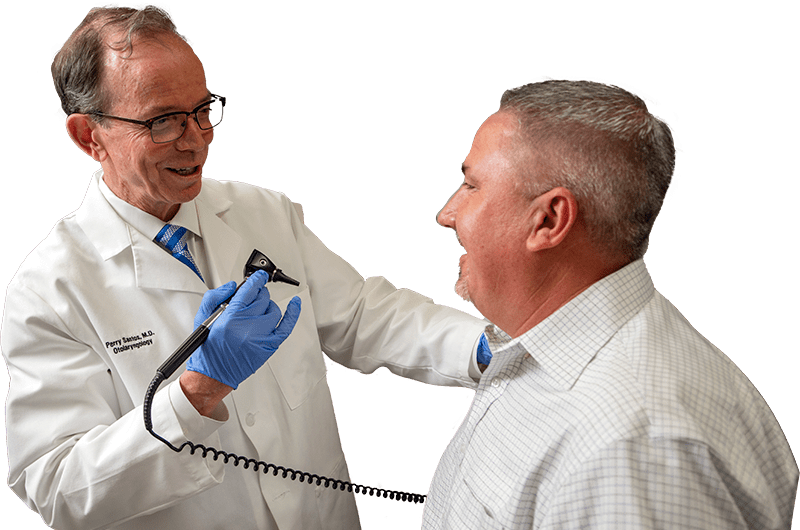
“When I first saw Dr. Santos, I couldn’t smell anything at all. I had a sore throat, eyes hurt, ears hurt, coughing, all that. Now I can smell great, smell everything. It’s been three years since surgery and clear and free of everything!”
![]()
Trae Tucker
Sinus Surgery Polyp Patient
“Sinusache”:
Coined by one of our creative teenage patients, a “sinusache,” is how she referred to her ongoing frontal sinus and facial headaches. What a descriptive term for this incredibly common symptom of sinus or allergy pain related to the forehead, between the eyes, and cheeks! These types of headaches can be brought on by increased allergy counts, changes in the barometric pressure, or infections.
Santos Sinus Center’s first line of defense against sinusaches is medical therapy. However, when patients experience these symptoms after aggressive medical therapy, Dr. Santos encourages the exploration of stereotactic balloon dilation, we have documented relief from these intense frontal, nasal, and cheek-area headaches.
We’re also happy to report that our creative patient is no longer experiencing her “sinusaches.”
Allergies:
At Santos Sinus Center, we like to treat allergies topically with nasal rinses using the highest quality topical nasal steroids. Other topical prescriptions may also be recommended to thin mucus or decrease mucus production. Patients with allergies that cannot be adequately managed using this simple nasal irrigation technique are typically referred to physicians who specialize in allergies for testing and management.
Polyps:
In most cases, patients who are experiencing nasal polyps will generally require surgery for complete removal. Santos Sinus Center uses aggressive medical therapy prior to surgery to help decrease inflammation of the sinuses and provide for a better surgical outcome. Another plus: A greater portion of sinus lining can be preserved by delaying surgery until after maximizing medical therapy. After surgery, topical management with steroid irrigations are very effective in eliminating or delaying recurrence.
Afrin Addiction:
People with nasal congestion depend on the frequent use of decongestant sprays such as Afrin (oxymetazoline) and Neo-synephrine (phenylephrine). Occasional use is usually harmless, but regular use builds dependence and can result in septal perforations with crusting and bleeding. Dr. Santos has successfully assisted his patients with a deliberate program to discontinue the use of these decongestant agents.
Sleep Disorders:
Difficulty sleeping is often a side effect of either nasal congestion or anatomical narrowing of the airways in the nose, throat, or lower throat. Nasal congestion can result from allergies, generalized thickening of the mucosal lining, polyps, thick secretions, or infection. Narrowing of the airways can be a symptom of septal deviation, abnormally enlarged turbinates, adenoid or tonsillar hypertrophy, or tumor masses.
Appropriate medical evaluation and treatment (certain conditions may require surgery) can help determine the causes of these conditions and alleviate symptoms for improved sleep quality.
Smell and Taste Disorders:
It may surprise you to learn that our senses of taste and smell are closely linked — even interdependent — given certain circumstances or health conditions.
Our “taste buds” are dependent on the tongue and the nose. On the tongue mucosal surface, there are tiny sensory organs recognizing and transmitting salty, sweet, sour, bitter, and umami stimuli to the brain. The human nasal mucosa has about 400 scent receptors with the ability to distinguish a trillion different odors. Airflow obstruction in the upper portions of the nose where the olfactory nerves reside can diminish our ability to smell scents and “taste” food.
Sometimes the loss of smell is due to a common cold virus, injury, or more recently, COVID-19 infections. Medical evaluation and treatment can help determine the root cause of the sensory loss and in some cases improve or restore sense of smell, i.e.: olfaction.
What Our Patients Are Saying
“Dr. Santos is the most skilled and kind physician you will be in the care of. Whether it is for you as an adult or for your child, you are in the best of possible hands under his care. I work in healthcare for a completely different network and he is the only one I would personally see or take my children to. I cannot recommend him enough. “
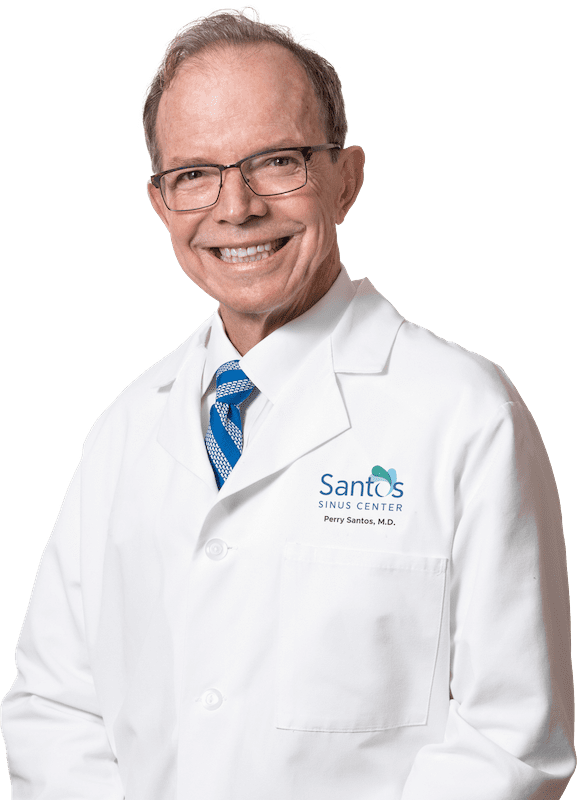
The Santos Sinus Center Difference
Dr. Perry Santos takes a conservative, patient-first approach and utilizes the latest technology and methods in the field of Otolaryngology - Head and Neck Surgery. His unique five-step process identifies the most beneficial treatment with the least amount of risk and recovery time possible specific to each patient’s history and conditions.
Meet Dr. Santos and learn more about his 5-step process.
